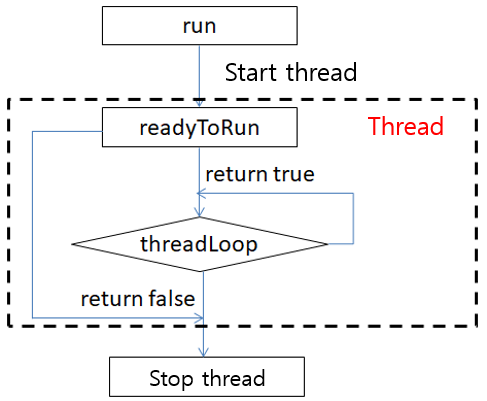Thread
시스템은 pthread를 지원합니다. pthread 인터페이스를 이해하면 posix 인터페이스를 사용하여 thread를 구현할 수도 있습니다.
또한 pthread에 대한 래퍼 클래스도 제공합니다. 여기에는 다음 세 부분이 포함됩니다.
- Thread.h:Thread class
- Mutex.h:Mutex class
- Condition.h:Condition class
사용법
헤더 파일을 인클루드한 후
Thread클래스를 상속하고virtual bool threadLoop()함수를 구현합니다. 또한 필요에 따라 readyToRun()함수를 구현합니다.#include <system/Thread.h> class MyThread: public Thread { public: /** * After the thread is created successfully, this function will be called, and some initialization operations can be done * in this function * return true Continue thread * false Exit thread */ virtual bool readyToRun() { LOGD("Thread has been created"); return true; } /** * Thread loop function * * return true Continue thread loop * false Exit thread */ virtual bool threadLoop() { LOGD("Thread loop function"); //Check if there is a request to exit the thread, if so, return false and exit the thread immediately if (exitPending()) { return false; } //Accumulate the count and display it on the screen loop_count += 1; mTextView2Ptr->setText(loop_count); //To observation, add sleep 500ms here usleep(1000 * 500); //Return true, continue the next thread loop return true; } };Thread object 인스턴스화
static MyThread my_thread;Thread 시작
//Call the run function of the thread class to start the thread //The parameter is the thread name, which can be arbitrarily specified. my_thread.run("this is thread name");Thread 종료
Thread클래스는 thread의 종료를 요청하는 동기식과 비동기식의 두 가지 함수를 제공하며 차이점은 다음과 같습니다.- void requestExitAndWait()
//Request to exit the thread and wait. The function does not return until the thread completely exits my_thread.requestExitAndWait(); - void requestExit()
//Request to exit the thread, the function returns immediately after sending the request but at this time, it does not mean //that the thread has also exited my_thread.requestExit();
위의 두 함수 중 하나를 호출 한 후
threadLoop함수에서bool exitPending()멤버 함수를 사용하여 스레드 종료 요청이 있는지 확인할 수 있습니다.virtual bool threadLoop() { LOGD("Thread loop function"); //Check if there is a request to exit the thread, if so, return false and exit the thread immediately if (exitPending()) { return false; } return true; }[!Note] 위의 함수는 thread를 강제로 종료하지 않고 thread 종료를 요청하는 표시를 추가합니다.
threadLoop함수에서 특정 작업을 수행하고 있고threadLoop함수가 종료되지 않은 경우 thread가 중지되지 않습니다. 올바른 접근 방식은threadLoop에서 thread 종료 요청을 확인하거나 종료 조건을 확인한 다음false를 반환하는 것입니다.- void requestExitAndWait()
[!Warning]
threadLoop함수에서requestExitAndWait및requestExit함수를 호출하는 것은 교착 상태를 유발할 수 있어 금지되어 있습니다.
- Thread가 실행 중인지 확인
if (my_thread.isRunning()) { mTextView4Ptr->setText("Now running"); } else { mTextView4Ptr->setText("Already stop"); }
Thread 프로세스
위의 단계를 순서도와 함께 이해하면 더 쉽고 깊게 이해가 가능합니다.

Sample code
더 자세한 내용은 Sample Code의 ThreadDemo 프로젝트를 참고하십시오.
